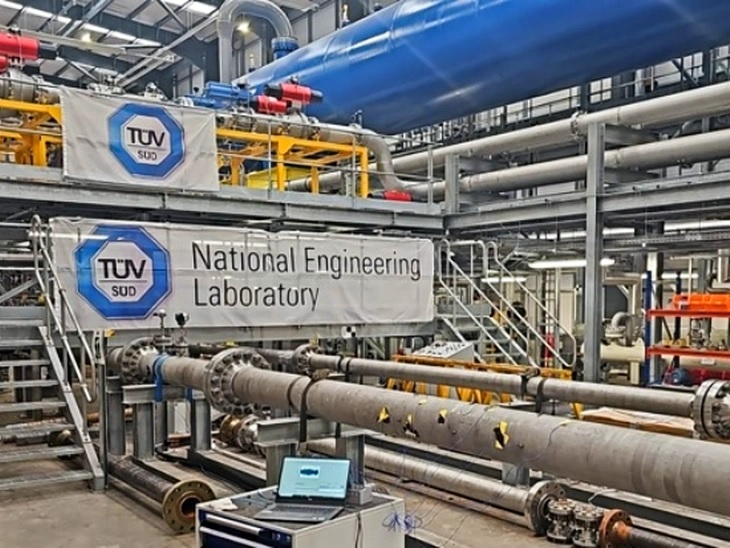Sensor Developed by Unicamp and UnB Advances in International Tests and May Become a Product for the Oil Industry
Non-invasive device measures the ratio of gas to liquid in pipeline flows through vibration — strategic information to optimize operations, reduce costs, and enhance safety in the oil industry.
T&B Petroleum/Press Office CEPETRO15/09/2025 17:55

Photo: National Engineering Laboratory TÜV SÜD, in Glasgow, where the tests were carried out.
A technology developed in partnership between the University of Campinas (Unicamp), through the Center for Petroleum Studies (CEPETRO), and the University of Brasília (UnB), has just taken an important step toward industrial application. It is a non-invasive sensor capable of measuring, based on pipeline vibrations, the gas-liquid fraction in multiphase flows — information considered a priority by Petrobras, which commissioned the development of this technology to address strategic operational challenges.
In practice, the technology makes it possible to identify the proportion of gas and liquid inside a pipeline without installing internal equipment or interrupting the flow. This data is valuable across different stages of the oil chain — from well production and flowlines to pipeline transportation and refining processes. At all these stages, knowing the gas-liquid fraction helps adjust pumps, optimize valves, improve energy efficiency, and reinforce operational safety.
Advancing in TRL – The project’s major milestone is its progress in Technology Readiness Level (TRL). “We were able to test the technology under unprecedented conditions, very close to those of a real plant, reaching 110 bar pressure with different fluids and high flow rates. This allowed us to move from a lab-scale TRL (3 or 4) to levels 5 or 6, already in a near-field environment,” explains Professor Marcelo Souza de Castro, CEPETRO director and project coordinator.
The tests were conducted in partnership with Expro, a global energy services company contracted by Petrobras within the scope of the technology order. Expro evaluated different available technologies and selected the patent developed at Unicamp, in collaboration with UnB, to move forward with testing aimed at transforming it into a commercial product.
Scientific Collaboration – Throughout the research, several solutions were explored until the current sensor design was reached, with a master’s thesis supervised by Professor Adriano Todorovic Fabro (UnB) standing out. This work resulted in a patent filed in Brazil and the United States. “The sensor is a clamp-on type, installed outside the pipeline without contact with the fluid, offering a much safer and less invasive alternative compared to traditional methods based on radioactive probes,” Fabro explains.
According to him, the project is an example of deep tech innovation, where scientific advances directly generate technological solutions. “It was the first time we showed, in the literature, the relationship between the gas-liquid fraction and vibration behavior in pipelines. This paves the way for practical applications with significant impact,” he adds.
Testing and Impacts – The trials with the sensor, conducted at the National Engineering Laboratory TÜV SÜD in Glasgow, Scotland, validated the technology under conditions similar to those observed in offshore scenarios — with pipelines up to 10 inches in diameter and very high pressures — which could not be replicated in Brazil. “The preliminary results were very encouraging and reinforce Petrobras’ and Expro’s interest in turning this research into a commercial product,” says Castro. According to him, this progress is crucial as it shows the technology is ready to start meeting the strict safety and operational standards required in oil platforms.
For the researchers, the project also marks a milestone in university-industry collaboration. “In Brazil, we still face challenges in transforming academic discoveries into products. Attracting the interest of a multinational like Expro demonstrates the relevance of what we are developing,” Castro highlights.
Fabro adds: “Universities play an essential role in reducing technological risks for industry by delivering innovative solutions based on solid scientific research. In this case, we not only produced papers and patents but also advanced toward concrete applications.”
About CEPETRO: The Center for Petroleum Studies (CEPETRO) is a research hub at the University of Campinas (Unicamp) with more than 35 years of history, focused on oil, gas, renewable energies, and energy transition. Currently located across five buildings with over 5,000 square meters of space, it operates 10 dedicated laboratories and involves more than 350 researchers. In addition to conducting research and development (R&D) projects, CEPETRO provides technical and consulting services, trains highly qualified professionals, and promotes knowledge dissemination. Its R&D projects are funded by companies, foundations, and government research agencies. CEPETRO is among the largest recipients of R&D resources under the ANP’s RD&I clause.



